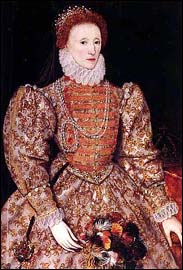
QUEEN ELIZABETH TO SIR FRANCIS WALSINGHAM.
[February 11, 1570.—Extract.]
We have by the last letters of the Duke1 understood in expresse words, that he himselfe is earnestly disposed to do anything that may mayntaine the amity that is betweene the King and us, and particularly that he hath attended to have restitution made, as our marshalls on both sides have thought meete, and meaneth to send over some speciall person of creditt, to explain some small difficulties rising thereof, and to put the whole in execution. These kinds of dealings and offers, you may say, are very agreeable to us, who by manie meanes made appear that the late differences have not growne of as, nor as we think of the King's owne disposition, but by untowardnes of ministers. And now whilst we are well content therewith, we are sorry to think that certain reports which we hear out of Spaine should be true, either in the whole or in part, and as we would be gladdest they are false, so are we desirous that we might know them certainly from the King to be false. And you shall say because we have seen some sure proof of that ambassador's good disposition to conserve the amity betwixt the King his master and us, wherein he is much to be commended, and that he may with more expedition and readiness by the way of Fraunce certify the King and procure some answer, than he may conveniently any other ways, you shall say that we thought meete to impart these speeches which we so mislike as being altogether so contrary to that which we do conceive of the King's good will, and of those late friendly offices of the Duke of Alva, praying him not only to shew you his opinion thereof, but also to advertise the King and procure us some answer.
We have heard and knowne it to be true, that certain savage rebells, being men of no valour, had fled out of our realme of Ireland into Spaine, and to cover their lewdness, and procure both reliefe for themselves and for such like as they are in Ireland, they do pretend their departure out of the land for matter of religion, where indeed they be neither of one nor other religion, but given to beastiality, and yet have they writt enough to shewe hypocrisy for their purpose. Since the first arrival of some of these, we knowe also that an Englishman, a subject of ours, named Stewckley, no unknowne (as we think) for his former prodigall life, both in Spaine, and other places, and notwithstanding great favour shewn unto him divers tymes upon hope of amendment, and some tokens of his repentance, he did this last summer, pretending to come ouf of Ireland hither, suddainly turn his course into Spaine, and as we heare hath lighted into the company of the foresaid fugitives and rebells, pretending by his superfluous expense, which is altogether of other men's goods, to be a person of some quality and estimation, and able to do some great thing in ireland, whereas he hathe not the value of a marmaduke in land, or livelihood, he hath so solicited the King, or some about him, with vayne motions, as it is by him bruited, and otherwise also with some creditt reported unto us, which yet we do not believe, that the King will send a Captaine of his, such a one as Julian Romero,2 or such like, with a number of souldiers into Ireland to followe some vaine device of those rebells. Whereof we cannot but marvel that the King or any of his counsell, being of experience, can so lightly give creditt to such a companion as Stewkley is, who could never live long in any quiet condition at home, of whom we are not disposed to say much, because we cannot say any good of him, but may say, it shall be sufficient that his conditions may only be enquired of, then we doubt not whosoever shall know that will take heed how to adventure any thing with him. And yet whatsoever hath been conceived that any person of any degree, being the King of Spaine's subjects, coming into our realme of late years, as many have done for safetie of their lives for matters of their consciences, (as we have always understood,) yet we do assure this of our honour, that there was never person of any degree, that did motion unto us any matter offensive to the King or to his Low Countries, when opportunities served for such purposes, that was ever allowed by us, or any such motion, or that ever received reward, or comfort therein, but was rejected. Such hath been our sinceritie in these tymes, not to give any comfort to the hurt of the King or of his countries; and now, if these reports which we heare should be true, we might think ourselves evil recompensed, and should be provoked for our defence to use such meanes as otherwise of ourselves we did never allow or like.
1. The Duke of Alva.
2. Julian Romero was the captain appointed by the King of Spain
to attend Stukeley into Ireland.
|
|